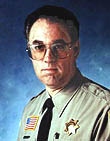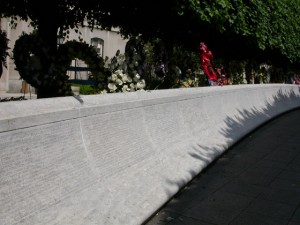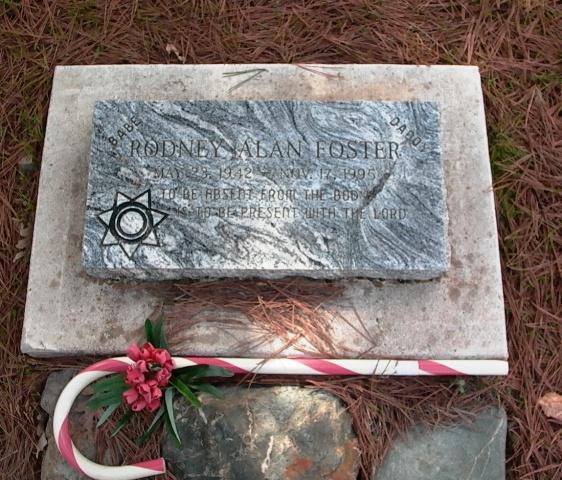
In the summer of 1995, I went on a group camping trip to Medicine Lake. My mom wasn’t much of a camping fan, but I was always game, and a bunch of my youth group friends were going to be there. So when Rod and Margo Foster offered space in their camper, I was thrilled. I knew them pretty well by then, because they’d given me rides home from church choir practice, and were generally just really nice people.
A few months later, on Nov. 17, 1995, Deputy Rodney Alan Foster was on duty as a Siskiyou County Sheriff correctional officer. The jail had a hepatitis outbreak, and the rural community didn’t have a lot of medication, so he headed for the nearest city of Redding (then a population of probably no more than 50,000), a drive of about an hour and a half.
Around 6:15 p.m., Rod rounded a curve on Interstate 5 where a big rig truck had jack-knifed and flipped over. Rod was the first one on the scene, and he never had a chance. His county van was shoved under the big rig, and 30 more vehicles soon slammed into the wreckage.
Today marks 15 years since Rod Foster died. I was a teenager and had never before faced human loss. I have a vague memory of my mom hanging up the phone and breaking the news that he had died, but I don’t remember how I reacted or how I felt. Somewhere I might have a diary entry about it, but as I write this, my memory doesn’t resume until the day of the funeral.
It was held at a church in Yreka, and I remember the wood paneling and dim lighting. I remember parking, and walking in the church where law enforcement officers lined the walls. Later, we joined the funeral procession through town. As we wound through the cemetery our Ford Escort began overheating, as it always had, but we kept going. I remember the gray clouds, and the gun salute at the graveyard.
One week later, a few miles down the freeway from the scene of Rod’s death, seven people died in another wreck. Because of the higher death toll and the even closer proximity to Thanksgiving, that story made headlines throughout the state.
Rod’s death didn’t reach the headlines outside our community. But yesterday I was surprised to discover that his crash actually made news across the whole nation. One of the 17 people injured in the wreck was former Yankees player Don Larsen, who 39 years earlier had become the first and only baseball player to pitch a perfect no-hit game in a World Series, a record he still holds.
I have long since moved away from the town, and I haven’t talked to Rod’s widow in many years. But when I recently drove down that stretch of Interstate 5, I thought of Rod. I recalled the weeks and months after the crash, when the speed limit was drastically reduced from 65 mph to 45 mph. It was later revealed that the state had used inferior materials when resurfacing the roadway. The combination of the crumbling road surface and the sharp curves was deadly.
A couple years ago a newspaper editor wrote about driving that stretch of highway, wondering why the most sparsely populated part of California had the nicest freeway. I fired off a rather lengthy e-mail, telling him that it took multiple fatal crashes and a lawsuit by a fallen officer’s widow before the state actually fixed what had been a very badly surfaced road. I’m not a fan of frivolous lawsuits, but Rod’s family deserved the $1.5 million they were awarded – I remember how that road worsened in the summer preceding Rod’s death, and how we tried to dodge the ever-expanding potholes as the road literally crumbled. I’m glad state officials fixed the road well enough that, years later, it got the attention of a newspaper editor.
And that is why I like to think that Rod did not die in vain. His name is one of just many at the national law enforcement memorial in Washington D.C., and he wasn’t mentioned in the articles that updated the baseball star’s status. But Rod’s death helped force the state to admit their fault and work round the clock to fix their mistake as fast as possible. Perhaps this spared other families the feelings of loss and devastation.



